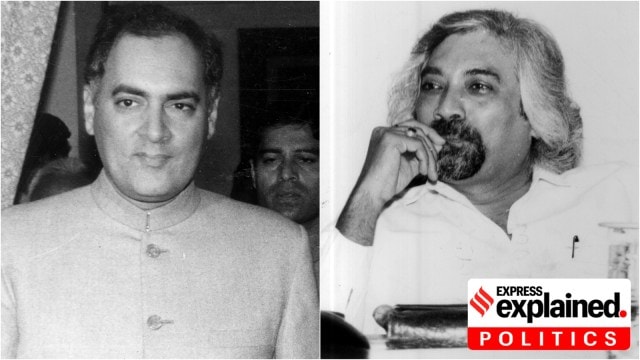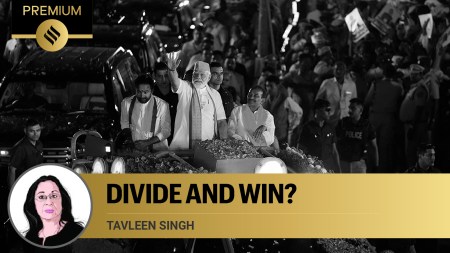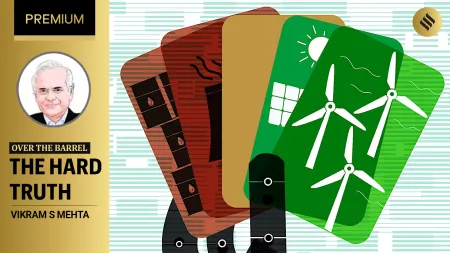- India
- International
Sam Pitroda controversy: How inheritance tax works
The use of inheritance tax as a tool for redistribution of wealth to address income inequality has been discussed widely. Over the years, India abolished estate duty, wealth tax, and gift tax.
 Sam Pitroda (right), whose comment on inheritance tax provoked Thursday’s political controversy, was Rajiv Gandhi’s adviser. (Archive)
Sam Pitroda (right), whose comment on inheritance tax provoked Thursday’s political controversy, was Rajiv Gandhi’s adviser. (Archive)‘After Sam Pitroda, a former adviser to Rajiv Gandhi and an associate of Rahul Gandhi, described the inheritance tax in the United States as an “interesting law”, Prime Minister Narendra Modi alleged on Wednesday that the Congress would snatch property left behind by people for their children — the party’s mantra, he said, was to “loot”, “zindagi ke saath bhi, zindagi ke baad bhi (both when you are alive and when you are dead)”.
During the day, as BJP leaders seized on Pitroda’s statement, Congress communications chief Jairam Ramesh said there was “no plan whatsoever to introduce an inheritance tax”, and it was in fact, the “Modi Sarkar that has wanted to do so (bring an inheritance tax)”.
The use of inheritance tax as a tool for redistribution of wealth to address income inequality has been discussed widely. India did have an inheritance (or death) tax once. The tax, which was known as estate duty, was introduced in 1953, and was abolished in 1985 by the government of Rajiv Gandhi. India also had a wealth tax and a gift tax, which were abolished in 2015 and 1998 respectively.
There was some talk about the reintroduction of inheritance tax in the 2019 Lok Sabha election cycle — and the idea was discussed internally during the Budget making exercise that July.
Calls to tax billionaires to build more equitable societies have been growing louder globally. There have been discussions about levying a global minimum corporate tax rate, and a proposal in the US to levy a minimum 25% tax on taxpayers with wealth over $100 million. France and Brazil have pushed for a G20 declaration on taxing the super rich by July.

Ways to tax wealth
Taxes are levied on the flow of income on wealth or at the time of transfer of wealth or on the stock of wealth linked to the value of owned assets as a one-time levy. There can be a capital levy on income from wealth or ownership of assets resulting in capital gains, transfer taxes in the form of wealth tax, inheritance tax, estate tax, or gift tax at the time of transfer of wealth or assets.
Taxes can also be levied on a combination of income and wealth. As mentioned above, the Biden Administration has proposed legislation for a ‘Billionaire Minimum Income Tax’ of at least 25% on their full income, including unrealised gains.
The taxes in India
The now abolished estate duty was inheritance tax with a threshold of Rs 1 lakh, and progressive rates from 5% to 40% on the principal value of the estate exceeding Rs 20 lakh. The Estate Duty Act, 1953 was amended in 1958 to change the definition of accountable person, lower the applicable threshold, and redefine slabs.
Even after its abolition, the idea of inheritance tax remained alive and was part of official and unofficial discussions. In December 2018, then Finance Minister Arun Jaitley said at a public event that hospitals, universities, and other institutions in developed countries receive large endowments due to factors like inheritance tax, but this practice is not prevalent in India.
The Narendra Modi government announced the abolition of wealth tax and its replacement with a surcharge on the super rich in the Budget for 2015-16. Jaitley said while wealth tax was 1% on assets of Rs 30 lakh and above (excluding equities, bonds, and first house), the total wealth collection in 2013-14 was only Rs 1,008 crore. An additional surcharge of 2% was levied on individuals with taxable income of Rs 1 crore and above, which was expected to bring revenues of Rs 9,000 crore.
Cost and revenues
Wealthy taxpayers are seen as being sensitive to high rates of taxation, which often results in flight of capital and investment to tax havens or tax jurisdictions with favourable tax rates. Also, high tax rates do not make sense if the cost of collection and administration of these taxes are high compared to the revenues that arise.
In the initial years of estate duty, collections were lower than the budgeted estimates. For instance, the government had budgeted Rs 25 lakh as estate duty revenue in the first year of implementation in 1954-55, which was later revised down to Rs 8 lakh.
In the following year (1955-56), estate duty was budgeted at Rs 21 lakh, but came in much lower at Rs 13 lakh. The high cost of collection and double taxation in various forms of wealth tax were cited as reasons for abolishing estate duty.
In his Budget speech of 1985-86, then Finance Minister V P Singh said the existence of two separate laws for tax on property — wealth tax before death and estate duty after death — amounted to “procedural harassment” of taxpayers. He also said that estate duty had not achieved its objectives of reducing the unequal distribution of wealth and assisting states in financing their development schemes.
“While the yield from estate duty is only about Rs 20 crore, its cost of administration is relatively high. I, therefore, propose to abolish the levy of estate duty in respect of estates passing on deaths occurring on or after 16th March, 1985,” Singh said.
The issue with wealth tax was the same. “Should a tax which leads to high cost of collection and a low yield be continued or should it be replaced with a low cost and higher yield tax? The rich and wealthy must pay more tax than the less affluent ones. I have therefore decided to abolish the wealth tax and replace it with an additional surcharge of 2% on the super rich with a taxable income of over Rs 1 crore,” Jaitley said in his Budget speech for 2015-16.
Gift tax was abolished in 1998 citing lower revenues. “Gift tax has been levied in India since 1958. The revenue yield from this tax has been insignificant. Last year we collected barely Rs 9 crore. The Gift Tax Act has also not been successful as an instrument to curb tax evasion and avoidance. I, therefore, propose to discontinue the levy of gift tax on gifts made after 30th September, 1998,” then Finance Minister Yashwant Sinha said in his Budget speech in June 1998.
Gift tax was, however, revived in a different form later. In his Budget speech in July 2004, then Finance Minister P Chidambaram said there was a need to plug a loophole to prevent money laundering. Thus, purported gifts from unrelated persons above the threshold of Rs 25,000 (later raised to Rs 50,000), were decided to be taxed as income. Gifts from blood relations, lineal ascendants and descendants, and gifts on occasions like marriage continued to be exempt.
Experience elsewhere
A March 2024 note by the International Monetary Fund (IMF), said tax rates on wealth have generally declined around the world over the past decades, with a decline in average corporate income tax rates being an important component across country groups of all income levels.
Citing data for the Organisation of Economic Co-operation and Development (OECD) countries, the IMF said 12 OECD members had wealth taxes in 1990, but only three (Switzerland, Spain, Norway) now levy a broad-based wealth tax.
Researchers have flagged low tax rates often paid by wealthy individuals. According to the EU Tax Observatory, an independent research laboratory at the Paris School of Economics, global billionaires have effective tax rates equivalent to 0-0.5% of their wealth due to the frequent use of shell companies to avoid income taxation. A global minimum tax on billionaires, equal to 2% of their wealth, could potentially raise close to $250 billion from fewer than 3,000 individuals annually, it said in its Global Tax Evasion Report 2024.
Wealthy taxpayers often reduce the incidence of average tax rates by exploiting loopholes and preferential treatments of certain capital income, the IMF said in its note. Citing data from various studies, the IMF said the wealthiest 25 individuals in the US faced an effective average tax rate of only 3.25% while a rate of 9.4% was reported for the top 400 families.
More Explained
EXPRESS OPINION
May 07: Latest News
- 01
- 02
- 03
- 04
- 05








































